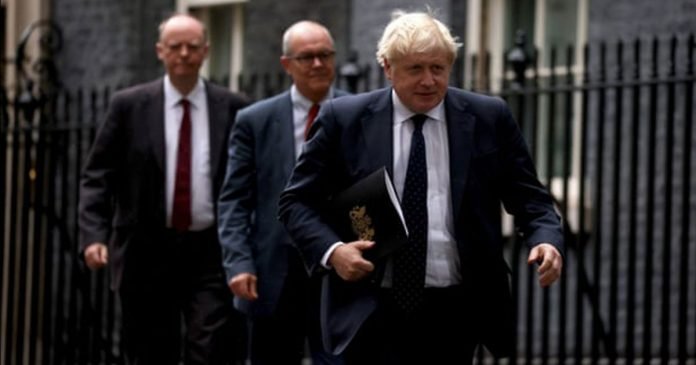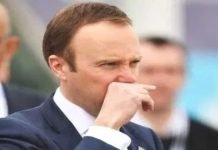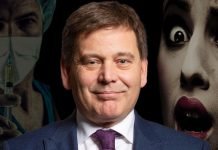
Several MPs heckled the Health Secretary over the contingency plans as he continued to layout Plan-B
Sajid Javid sparked a backlash from backbench MPs in the Commons this afternoon when he said the Government will be recommending the use of face masks in crowded indoor settings.
The Health Secretary made the recommendation as he unveiled the Government’s winter Covid plan.
He added that people should also meet outdoors or in well-ventilated areas if possible.
Javid said that people should be “wearing a face mask in crowded and enclosed spaces where you come into contact with people you don’t normally meet” this winter.
Several MPs were unhappy with the suggestion, with audible jeers heard in the chamber, including those from former Tory minister Sir Desmond Swayne.
The Health Secretary also told MPs the Government was preparing a “Plan B” that would include a number of contingency measures to cope with a Covid-19 surge.
Such measures could include the mandatory use of face coverings, the introduction of Covid vaccine passports and asking people to work from home.
Speaking over the heckling, Mr Javid said: “Any responsible Government must prepare for all eventualities, and although these measures are not an outcome anyone wants, it’s one we need to be ready for just in case.”
Downing Street said there was no specific metric for triggering Plan B measures but the Government would continue to monitor a range of data, including hospital admissions, the number of new cases and vaccine effectiveness.
The Prime Minister’s spokesman said: “It is right to look at a range of metrics and not be overly prescriptive and consider the latest advice we are getting from experts, like Professor Whitty and others.”
The Health Secretary said he hoped the Plan B option would not be needed and primarily outlined the Plan A approach that prioritises vaccinations, test and trace, funding the NHS and social care, issuing guidance to the public and taking an international approach.
These factors make up the Government’s new five pillar approach to tackling Covid during the winter months.
The first referred to extending the vaccination programme, including the new booster vaccine programme and the decision to offer jabs to 12 to 15-year-olds.
Secondly, the Government will ensure PCR testing remains free for those with Covid symptoms and for close contacts of confirmed cases.
Regular asymptomatic testing with lateral flow tests will also continue free of charge.
But the Government’s 32-page document outlining the autumn and winter plan said the tests won’t be free forever and the cost will soon become the responsibility of individuals and businesses.
The Government will also continue to support health and social care, with Mr Javid saying it is “highly likely” that NHS staff will have to be fully vaccinated.
The fourth pillar related to self-protection and saw the Health Secretary ask the public to follow guidelines such as meeting people outdoors where possible and wear masks in crowded indoor spaces.
Lastly, Mr Javid said the Government will be producing a new framework for international travel which Transport Secretary Grant Shapps will provide further updates on ahead of the formal review point on 1 October.
The coronavirus briefing, led by Prime Minister Boris Johnson.

Vallance stresses it’s important to ‘go early’ if new Covid restrictions needed
Here are the main points from Boris Johnson’s press conference. As has often been the case at these events, the most interesting answers have probably been those from the scientists – although they could probably do with some decoding; one suspects that if Prof Chris Whitty and Sir Patrick Vallance were running the country, the autumn and winter Covid plan would be a little more robust.
- Vallance, the government’s chief scientific adviser, stressed that it was important for the government to “go early” in terms of introducing new restrictions if cases continue to rise. He said:
If you look at, across the channel, countries where you’ve got similar levels of immunity and some higher degrees of restriction, what you can see is that the cases are going down.
So we’re at that pivot point where things are flattish at the moment. If they go up quickly, then, as I said, you’ve got to go early in terms of getting on top of it. You can’t wait until it’s late because you have to do more.
At no point did Vallance say that what the government was doing was not enough, but he gave the impression that if the government had adopted tougher measures today, he would not have been upset about it. This is also one of the messages from the Sage minutes released earlier. Sage, which is co-chaired by Vallance, said:
Sage reiterated the importance of acting early to slow a growing epidemic. Early, “low-cost” interventions may forestall need for more disruptive measures and avoid an unacceptable level of hospitalisations.
Sage noted that European comparators with similar levels of vaccination have maintained more interventions (masks, vaccine certification, work from home) than the UK and are seeing their epidemics decline.
- Whitty, the government’s chief medical adviser, warned about the threat posed by winter. He said that respiratory viruses were “hugely advantaged” by conditions during winter and that last winter the Delta variant was not a problem.
- Johnson said the possible plan B measures set out by the government today would not necessarily be introduced all at once. He said plan B had “a number of different shots in the locker”. He went on:
You wouldn’t necessarily play them all at once, far from it, you would want to do things in a graduated way.
We’re now in a situation when because so many of the population have some degree of immunity, smaller changes in the way we’re asking people to behave can have a bigger impact.
- He said the government would soon announce plans to make “the burdens of testing less onerous for those who are coming back into the country”. Earlier Sajid Javid, the health secretary, implied that PCR tests could soon be replaced with lateral flow tests for people entering the UK.
- Vallance said there was waning of immunity from the vaccines, but that they continue to provide good protection. He said:
The waning of immunity is clear. It’s greater for infection than it is for the waning against hospitalisations and deaths, so they’re holding up very well. This is some waning. And that waning is most evident in the people who are most at risk.
- Whitty suggested an increase in hospitalisations might be one of the most important factors in determining whether the government went to plan B. He said:
A gradual drift up [in hospitalisations] is one thing, if you suddenly saw a very rapid increase, then you have to consider taking earlier action. No one is claiming there was a good number – we would all like the numbers to be as low as possible – but in terms of what might trigger change, those are the things which I think are the most likely.
- Johnson said vaccine passports were “an important part of our repertoire”. He said they would have been a “lifesaver” last year because they could have allowed nightclubs to stay open.
- Whitty said the risk of going to hospital with Covid was “very substantially smaller” for vaccinated people than it was for vaccinated people. He explained:
If you just do a very crude look at the numbers, someone who is in their 30s and unvaccinated is running about the same risk as someone in their 70s who is vaccinated. It’s that level of difference.
Here are some of the key points covered:
- The UK is “incomparably better placed” to fight coronavirus now than it was last September, despite cases being higher, because of the high level of vaccinations and antibodies in the population, Johnson said
- Plan A, he said, is to continue to boost vaccination numbers, ask people to think about using face coverings, wash hands and get a test. Johnson said there are five million more people who should be getting the vaccine.
- The PM said the government was keeping in “reserve” extra measures to tackle coronavirus in the autumn and winter – a Plan B – including Covid passports, mandatory face masks and asking people to work from home.
- On the possibility of Covid passports, which have been criticised by some MPs and businesses, the PM said it was “just not sensible” to “rule out completely” the option. He said it “might still make the difference” between keeping businesses open at full capacity or not. But he added that not introducing them at the moment was the “right balance” based on the current data.
- The PM said given the high level of vaccinations and antibodies in the population, smaller changes can now make a bigger difference and “give us the confidence that we don’t need to go back to the lockdowns of the past”.
- Any extra Covid measures might not be implemented all at once, the PM said, but instead introduced in a “graduated” way.
- Asked what would trigger Plan B, England’s chief medical officer, Prof Chris Whitty, pointed to three things – the rate of people going into hospital, the rate of change of these hospitalisations, and the overall state of the NHS.
- It is possible that the combination of the winter and the Delta variant may result in Plan B needing to be implemented, Prof Whitty added.
Support Independent Journalism Today
Our unwavering dedication is to provide you with unbiased news, diverse perspectives, and insightful opinions. We're on a mission to ensure that those in positions of power are held accountable for their actions, but we can't do it alone. Labour Heartlands is primarily funded by me, Paul Knaggs, and by the generous contributions of readers like you. Your donations keep us going and help us uphold the principles of independent journalism. Join us in our quest for truth, transparency, and accountability – donate today and be a part of our mission!
Like everyone else, we're facing challenges, and we need your help to stay online and continue providing crucial journalism. Every contribution, no matter how small, goes a long way in helping us thrive. By becoming one of our donors, you become a vital part of our mission to uncover the truth and uphold the values of democracy.
While we maintain our independence from political affiliations, we stand united against corruption, injustice, and the erosion of free speech, truth, and democracy. We believe in the power of accurate information in a democracy, and we consider facts non-negotiable.
Your support, no matter the amount, can make a significant impact. Together, we can make a difference and continue our journey toward a more informed and just society.
Thank you for supporting Labour Heartlands











